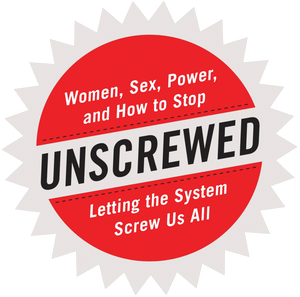
The answer, according to Jaclyn Friedman’s new book Unscrewed: Women, Sex, Power and How to Stop Letting the System Screw us All, is by no means clear-cut. Friedman presents a stark portrait of 21stcentury sexual culture where, despite over 50 years since the supposed sexual revolution, women are still caught between the virgin-whore dichotomy.
In her follow-up to Yes Means Yes and What You Really, Really Want, Friedman be takes us on a comprehensive journey through the social, cultural, political and economic landscape of our sex lives which is at once despairingly bleak and yet never without the hope that a genuine sexual revolution is still within our grasp. Her writing flows effortlessly, inviting you to delve into the world of current sexual culture that is “built on the rotten foundations of a gutted, aging unfinished revolution… [with] a bright candy colored coat of paint on top.”
She strips off layer upon layer of this neon pink facade exposing the false messages of empowerment (fauxpowerment) and girl power that we have been sold by the media, the music and film industries, by our schools, our churches and our States.
Friedman weaves feminist theory, her years of experience as a sex educator and the real experiences of those most impacted by this rotten system: women in general, but particularly, the LGBTIQ+ communities, indigenous peoples, sex workers, women of colour and homeless people. She skillfully melds the collective with the individual, demonstrating that the majority of our sexual anxieties and dissatisfaction, have concrete causes that are rooted in our social, cultural, political and economic environment and not simply a product of our personal neuroses.
If you have ever felt like a sexual freak, worried that you have too much sex or too little, wondered why you rarely orgasm, fretted over whether your tastes and turn ons are acceptable/normal, felt confused about contraception, not known how to define your boundaries, worried you are a prude or a slut or frigid or too lustful, wondered why you don’t understand the rules of the game, or confused about why you actually don’t feel all that liberated, then you are not alone. Through careful analysis backed up by reliable statistics and wide research Friedman shows us that the game is rigged against us and that no matter how we choose to live our sexuality few of us ever seem to get it right. The culture of fauxpowerment has led us to believe that we have sexual power we don’t actually possess.
While she does not deny progress that has been made in gaining access to contraception and expanding rights for women and the LGBTQI+ communities, she argues that there is a lot more to be done to unravel the centuries of oppression against disobedient bodies. We have barely scratched the surface. The game is still rigged because there is so little understanding of female sexuality, sexual response, health and even anatomy. Women’s value still rests on our whether we preserve our virginity or not. We are still seen as the gatekeepers of sex, we ‘give it up’ while men ‘take’ as if we were a tradable commodity. Sexual violence, harassment on and offline, and misogyny continue to be part of our everyday experiences. Sex-ed, if available at all to young people, is patchy at best and misleading or false at worst. Consent is still not understood. Survivors are still disbelieved when they speak out about sexual assault. Rape culture is alive and well. Universities continually fail to take action against perpetrators of sexual violence. Our media saturates us with narrow, two-dimensional, stereotyped images of what it means to be a woman, to be beautiful and to live our sexuality, actively excluding representations of people of ethnic, gender, sexual diversity and different abilities. The media co-opts our struggles, repackages them and sells us lies about what it means to be empowered. Coincidentally most people working in media are overwhelmingly white, male and able bodied.
She interrogates a diversity of specific experiences that show that the more removed you are from the “norm” of a cis, hetero, white, Christian, middle class male, the more likely you are to be impacted by this system. It is an analysis that often brought me to the point of despair, yet each time, just as I was about to give up on the world, she offers an example of someone who is fighting back against the system and trying to change their distinct realities. She speaks to change-makers from across the spectrum, sex workers, indigenous lawyers, homeless people, religious leaders, sex educators, academics and men who are working towards a healthier vision of masculinity, in a truly intersectional analysis, celebrating their efforts to change the system and transform individual and collective realities.
While the book is principally focused on the context of the USA, it can be applicable to the wider (though Western and primarily Anglo) world that is saturated with US media and pop culture. While women in the US struggle to retain their hard one reproductive freedoms, with even Roe V. Wade coming under threat, in Ireland we are still fighting tooth and nail for abortion to be decriminalised. Friedman charts the rise of the religious right and their manipulation of the struggle for reproductive rights to forward their Christian white supremacist agenda, while in Ireland we have been struggling with the direct influence of Catholic Church on public policy since independence.
Throughout the book she emphasizes how sex, no matter how we do it nor with whom, should be above all consensual, enjoyable and pleasurable. The fact that when it comes to sex, sex education women’s pleasure is rarely a prime consideration. She provides us with one of the best analysis of what toxic masculinity is and it’s negative affects on men, but above all how it puts women’s lives in danger, and what men can do to challenge the culture of toxic masculinity. Finally she offers hope and practical steps for how anyone, from whatever our social position is, wherever our strengths lie, so that we can “all unscrew our sex lives together.” These solutions are never simply individual but collective: “We need to resist in the sheets and on the streets.”
Share this:




